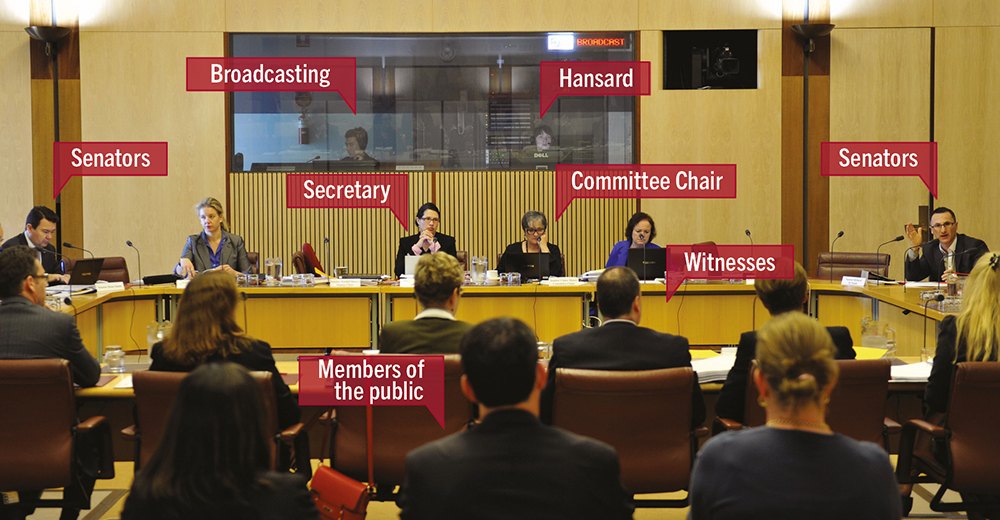The work of a Senator does not end in the Senate chamber. When the Senate is not sitting its committees are working—conducting meetings, gathering evidence, making site visits, holding hearings with witnesses in Parliament House and in other places across Australia. Committees then prepare reports about proposed laws or other matters affecting the Australian community. The results of these inquiries help Senators to shape laws and to make better-informed decisions about matters they debate in the Senate.
Committee inquiries also raise awareness in the community about important issues for Australia.
Committees inquire into all kinds of matters—workplace relations, foreign policy, immigration, health, proposed taxes and government spending.
Committee hearings are usually open to the public. In some cases however, evidence may be taken in private.
Senate committees are established at the start of each new parliament. In addition to the standing committees, there are other committees that deal with matters such as scrutiny of legislation and human rights, select committees established to inquire into specific topics, and joint Senate and House of Representatives committees.
Senate committees also conduct estimates hearings to scrutinise the work and spending of the government, and this function has raised the public profile of Senate committees in recent years.
What happens at a Senate hearing?
A committee may invite people who have made a written submission to appear before it, to present information and to answer questions.
People giving evidence to Senate committees are protected by parliamentary privilege. Parliamentary privilege means that witnesses cannot be sued or prosecuted for what they say in evidence to a committee.
Members of the public are welcome
Just as the parliamentary proceedings in the chambers are open for citizens and visitors to see and hear, so too are parliamentary committee hearings (unless hearings are held in private). Members of the public are welcome and encouraged to sit in on Senate committee hearings.

How do you organise to see a hearing?
If you visit Parliament House, check with the Visitor Service desk about current hearings. Most are open to the public.
Not in Canberra?
You can watch proceedings online.
You can also keep up to date with a committee’s hearings and activities by following the Senate on twitter @AuSenate, subscribing to an RSS feed, or using the track committee or inquiry function available from each committee home page or inquiry page.
Who organises committee hearings?
Small teams of parliamentary officers provide support to Senate committees. They do research, plan hearings, receive submissions, draft reports and provide procedural advice to committees.
What if I want to be involved in a Senate inquiry?
As well as providing a means for detailed scrutiny of legislation and other matters, parliamentary committees provide an opportunity for the community to be directly involved in the work of Parliament.
If you would like to contribute to a particular Senate inquiry, please contact the Department of the Senate’s Committee Office. Committee staff will be able to provide you with information and advice on:
-
a committee's program of activities;
-
how to prepare a submission; and
-
appearing before a committee as a witness.
Our commitment
As committee staff in the Department of the Senate, we are guided in our work by the Parliamentary Service Values and the Parliamentary Service Code of Conduct. We are committed to providing professional and high quality service.
We welcome feedback on our performance so we can improve our standards of service. If you have any comments or suggestions for improvement, please let us know.